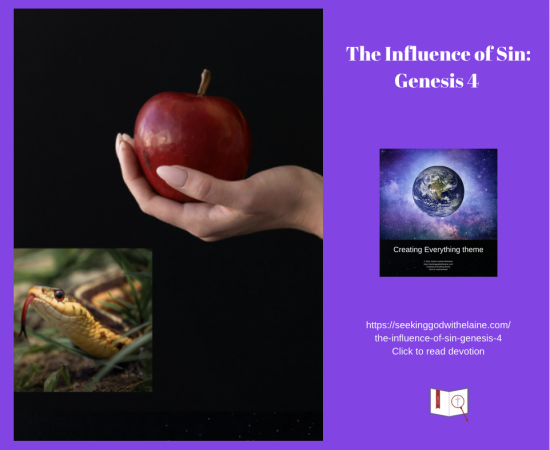
Families were meant to be cohesive and harmonious. No, that doesn’t happen because of sin.
Adam and Eve were obedient to God’s command to go forth and multiply (Gen. 1: 28).
They had two sons whom they named Cain and Abel. We aren’t told the age difference between Adam and Eve’s boys. We know they aren’t twins.
We shouldn’t forget the fact that Cain was the older brother. Abel should have been the one to look up to Cain, but Cain wasn’t a good role model.
We assume Cain didn’t see Adam and Eve sin because the original sin happened in Genesis 3, and they were born in Genesis 4. But they could have. They weren’t said to have been conceived in the image of Adam like Seth was (Gen. 5: 3).
Either way, Adam and Eve would have kept sinning, so they would have seen sin. Cain may even — probably — have sinned himself.
At first glance, it would seem good that Cain and Abel chose different occupations. That is true, but both were tied directly to the farm. It was also good that each chose a separate aspect of farming. They weren’t competing against each other.
Even though both occupations are clearly acceptable, shepherds show the meaning of the Gospel. Disciples are to nurture and grow others’ relationships with God.
Two Offerings Given
Both sons worshipped the One true God but in different ways.
Though Adam and Eve probably raised their sons the same way, their relationships with God were totally different. Each one of us make our own decisions as to whether we will obey God. Our parents don’t make it for us any more than our siblings do. They were brothers, not clones.
If we stop and think about it, we realize that we aren’t told how Adam and Eve worshiped God in the Garden of Eden. All that we can glean from it is that they regularly met with God.
In other words, the most important thing is being in God’s presence.
Adam and Eve raised their boys to worship God. They must have had regular Shabbat times He instituted this at the end of creation. Those times would have included being in His presence and sacrificing to Him.
The boys would have been shown the right way to offer sacrifices. That would include how to pick the sacrifice (without blemish) and how to offer it. They would have seen how God accepted it.
If God created — as He is the One Who fertilizes the egg and the sperm — all people like Abel, free will would have gone out the door. God would have been a dictator. He didn’t want that.
God is in the business of separating disciples from non-disciples. It started from the first children and will end at the sheep and goats.
We don’t know how long after the eviction this sin took place.
Once an animal was sacrificed to make clothes for Adam and Eve, a sacrificial system could be set up. Sacrifices have a specific purpose.
The sacrificial system was a foreshadowing that we need blood to cover our sins. Only blood can cover the stain and guilt of sin. The only blood that could do that once and for all was through Jesus shedding His blood on the cross.
Cain and Abel both came to the Lord for mercy and salvation. They agreed that God deserved their worship and adoration.
The boys offered their respective offerings through the same ceremony. While each brought offerings, they were different. In this instance, both sons wanted to take the fruits of their labors and honor God. Cain offered some of his crops, and Abel offered a firstborn lamb.
One Offering Accepted
Abel’s sacrifice was accepted because God was pleased with his life and offering. The fact that Abel brought a meat offering showed His commitment to God. He accepted the obligation to make an animal sacrifice to God.
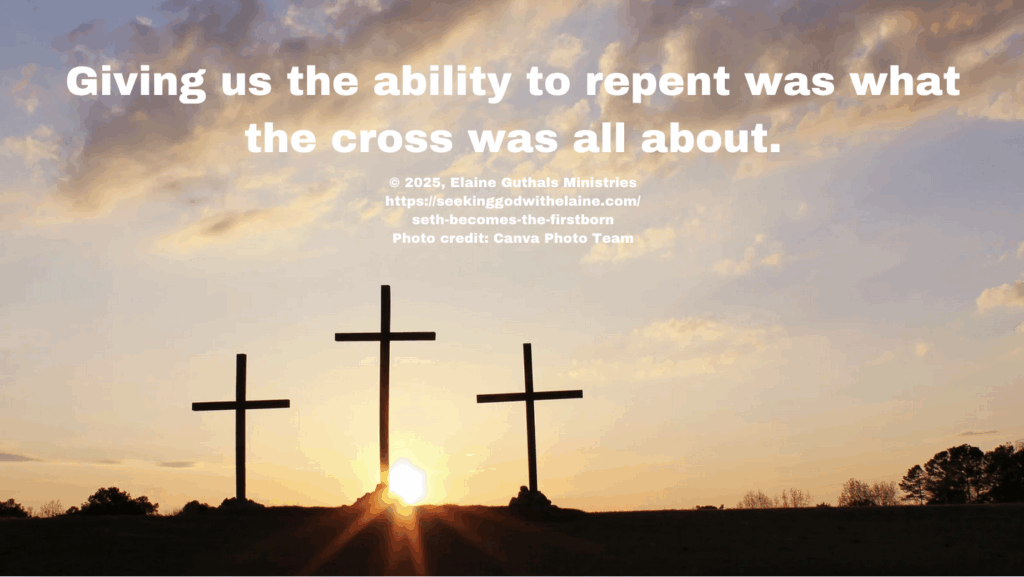
We have to worship though our lives, not just an occasional gift/sacrifice to God. We have to live through the week what God teaches us on Sunday.

Abel’s sacrifice was accepted because of his attitude. He acknowledged his sinfulness, rather than tried to justify his actions and beliefs. He had the mind/attitude of Christ.

Just as God accepted Abel and his offering, God rejected Cain and his offering.
We ask about why the burnt offering was accepted, but the grain offering wasn’t. Later when God gave the law about sacrifices, He allowed grain offerings along with burnt offerings. In fact, there is a whole festival designed around the first fruits.
We can come up with some reasons the offering wasn’t accepted. Cain’s offering did not indicate it was the first fruits, just some of his crops. It did not even say it was the best.
Most importantly, we can understand why Cain’s sacrifice wasn’t accepted. His heart wasn’t right. Cain only gave a thanks offering. He failed to admit and repent of his sins.

Cain lacked faith. Since he didn’t have faith, he didn’t have obedience.
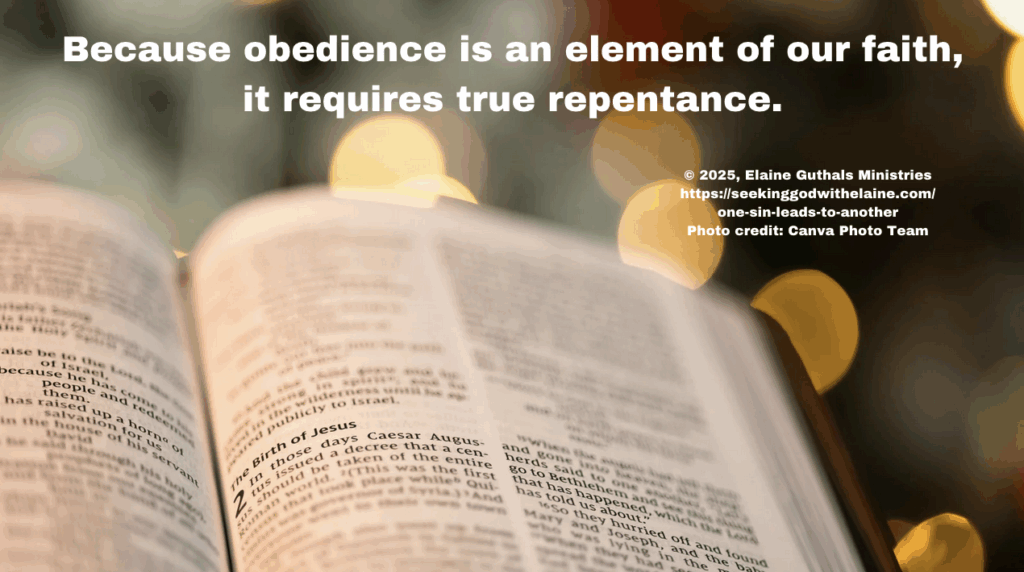
So, we can’t say loving God is enough. Being a good person isn’t enough.
We must worship God the way He requires at all times. But we can’t worship like Cain.

One Offering not Accepted
Cain thought his sacrifice was going to be accepted. But it was offered neither in faith nor obedience.
Look at the goats masquerading as sheep. People will get to Heaven and say, “Why aren’t you welcoming me with open arms?”
Yeah, they are worshiping. They aren’t worshiping in faith and obedience. Both elements are needed.
God removes those who do not believe and obey Him.
Cain saw that his offering wasn’t accepted and became very angry, and God called him on it.
So, Cain got angry. He didn’t understand why God neither accepted his gift nor the way it was given.
Cain’s anger probably had a strong foundation of envy. On top of that was the feeling of humiliation that had to have been a major element. I can’t but think that there has to be an ingredient of self-will in here.

Our sin is our consequence and responsibility.
Where was Abel when Cain was wrestling with his envy? Worshiping God.
Abel was doing everything he was supposed to be doing. We can read into that loving Cain.
And look what Abel got for that.
God wanted to know why Cain was envious. Cain shouldn’t have been focusing on the fact that Abel’s sacrifice was accepted and his wasn’t. He should have been focusing on why his sacrifice wasn’t accepted. Abel’s sacrifice — accepted or not accepted — was between him and God.
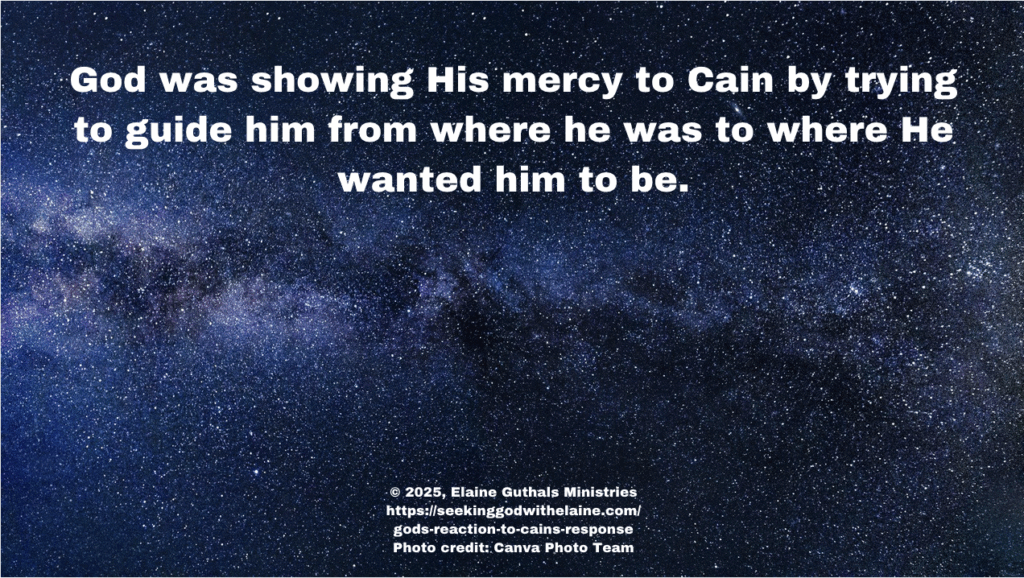
We must be righteous in the eyes of God.
A sacrifice is a God thing. We can’t keep it on our creature level.
Cain thought God should accept as good enough whatever way he offered as worship. He more than likely didn’t see the sacrifice as a substitute. “I’ll just offer God this grain, and He won’t expect anything more.”
Abel thought nothing we have to offer is good enough because we aren’t good enough.
If Cain would have offered the correct offering with the right attitude, then God would have accepted it along with Abel’s. Since God did not accept Cain’s sacrifice, the if/then turned into a since/then.

If we make a sacrifice to God without ABCDing, it could be for a number of wrong reasons. We don’t really understand our sin and God’s forgiveness. We understand, but we don’t care. We want to act like we want God’s forgiveness, but we only want the fire insurance.
Sin was waiting to overtake Cain. Because of our desire to sin — once we do — it rules over us. We desire to control sin, but it rules over us.
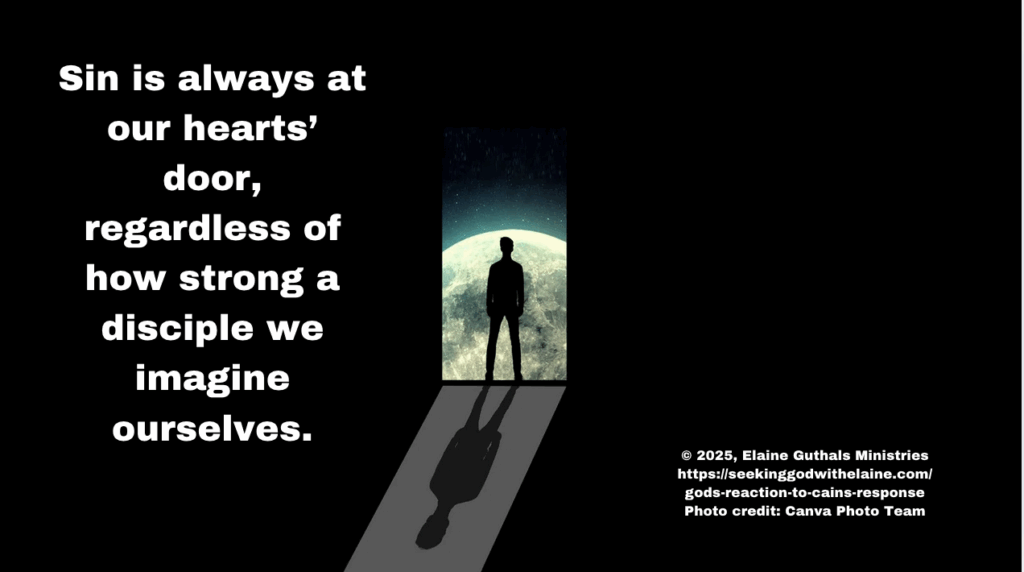
Satan makes sin bright and shiny in order to tempt us. This bright, shiny temptation is always just outside our hearts. It is laying in wait for the tiniest of cracks in our faith in God.
We have to choose Him always.
One Sin Leads to Another
Unchecked envy can lead to hatred and murder.
If the original sin was a test of obedience and disobedience, we look at the second sin as human interaction. If truth be known, some think this sin — murder — is a bigger sin than the original sin.
In reality, the second sin was false worship.
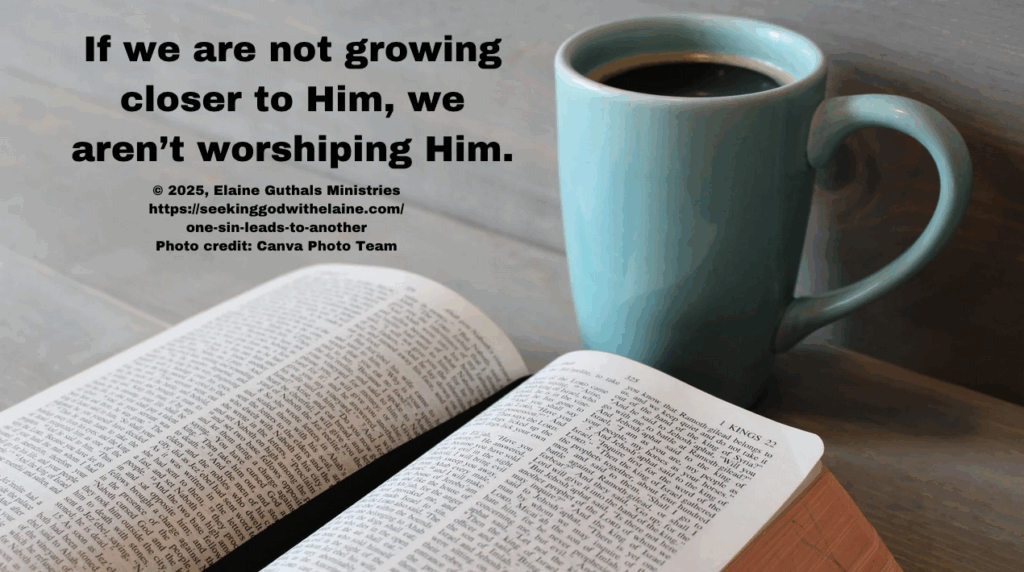
Cain’s disobedient heart became envious, angry, and hateful. That led to murder.
I don’t think Cain lured Abel out into the fields to kill him. It doesn’t say right then, the next day, or any indication of the time frame. We don’t know how long it took for Cain’s passion to bubble over.
Could Cain have planned the murder? Maybe. We just don’t have enough to make that determination.
We aren’t told if Cain picked up a rock and bashed in Abel’s head. Maybe Cain didn’t use a weapon but just strangled him.
As usual, the how isn’t as important as the why. Cain killed Abel because he threw a temper tantrum toward God. He lost one thing that God is adamant that we need to be — self-control.

Whether Cain lost it and attacked Abel or planned that outcome, he did not discipline himself to always follow God.
The Opportunity to Repent
It doesn’t sound like it took long for God to catch up with Cain. At a minimum, it could mean it was after Cain came back from the field. At most, it does mean that it is after he killed Abel. But again, we aren’t told the time frame.
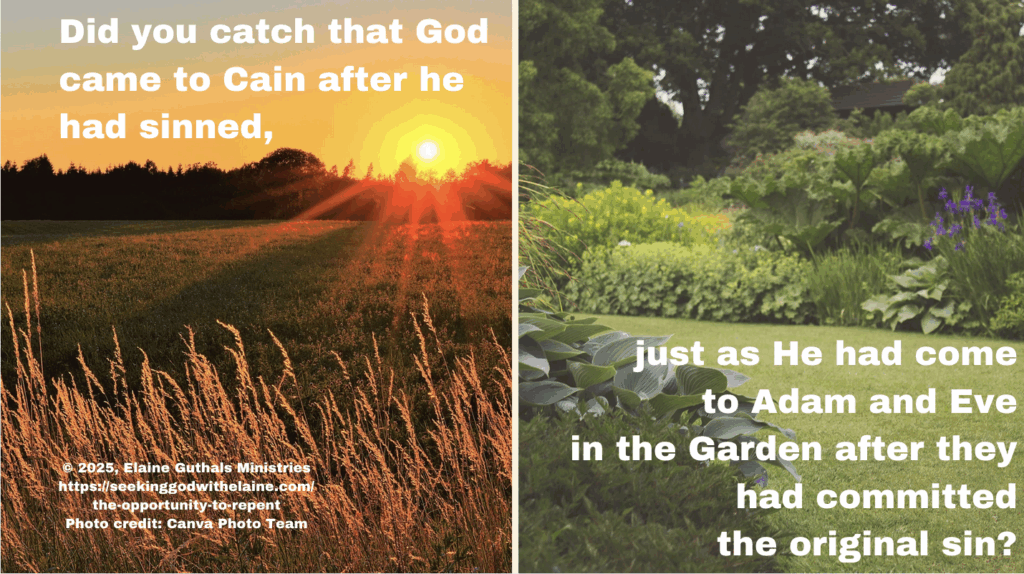
Even though God knew Cain had killed Abel and didn’t have to ask, He allowed Cain the opportunity to repent. Just as He had done with Adam and Eve in the Garden, God was giving him the opportunity to confess and repent to increase his faith.
Cain did not do as Adam and Eve tried to do — deflect and excuse. Cain refused to acknowledge his actions as sin.
Yeah, read that again. Cain thought it should be okay that he killed his brother.
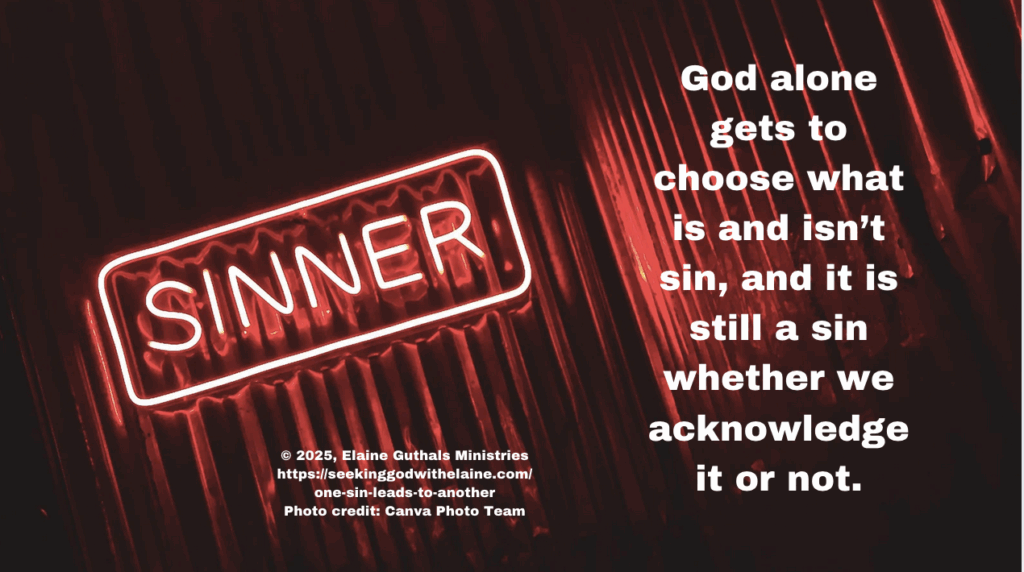
Satan is the one that says we don’t need to take responsibility for our actions. He tells us to do the exact opposite of what God wants.
Sin cannot be forgiven if we don’t acknowledge what we did was disobedient to God.
Cain didn’t want to be questioned about what happened to his brother. God asked Cain where Abel was, and Cain immediately lied.
Cain tried to deflect God’s question by claiming ignorance. Did Cain really think his anger was going to fix everything? Was his sarcasm going to earn points with the Sovereign God?
Talk about selfish! That just shows us how hard Cain’s heart was. He was only thinking about himself and his hatred of Abel because of his perceived slight.
Abel had to take responsibility for his actions, just as Cain did for his. Abel had to decide on his own whether he would follow God or not.
But that tells us that we have a spiritual responsibility to others. This is very evident in our marching orders.

But isn’t that what the Plan of Salvation is all about? Jesus didn’t say, “Am I my brother’s keeper?” No, He said, “I will be the substitute for everyone because I care that much for them.”
How do the two greatest commandments describe what morality reality is? True morality is the love of God and the love of others. When we do not have that, we may find the very element of murder within us.

Cain’s Punishment
Cain received his punishment. He broke both of the greatest commandments when he chose not to repent.
God did not accept Cain’s worship, but He did not banish him forever. He gave him a second chance.
Cain killed Abel, and God punished him from His presence. There was no third chance.
That is what mercy is. God doesn’t punish us as we deserve. He also holds off our punishment until it is our time to be punished.
But if we think that we aren’t going to be punished, we read right over the part about being cursed. We don’t want to be cursed, which is more than being cussed at.
There is a link between sin and its punishment. God does not want the sin to happen. But when it does, He wants the punishment to show us what needs correcting in our lives.
One thing we may or may not recognize is part of Cain’s punishment was giving up his birthright. We would say Cain’s punishment hit him in the pocketbook.
Cain not only had his occupation taken from him, but he also had his purpose taken. He lost what he offered God. The one we would see as a homebody would after that be homeless and a wanderer.
Cain lamented his punishment. But he still wasn’t repentant for killing Abel. He was sorry he got caught.
Cain’s first thought was he was being banished from the land. He was still focusing on worldly issues.
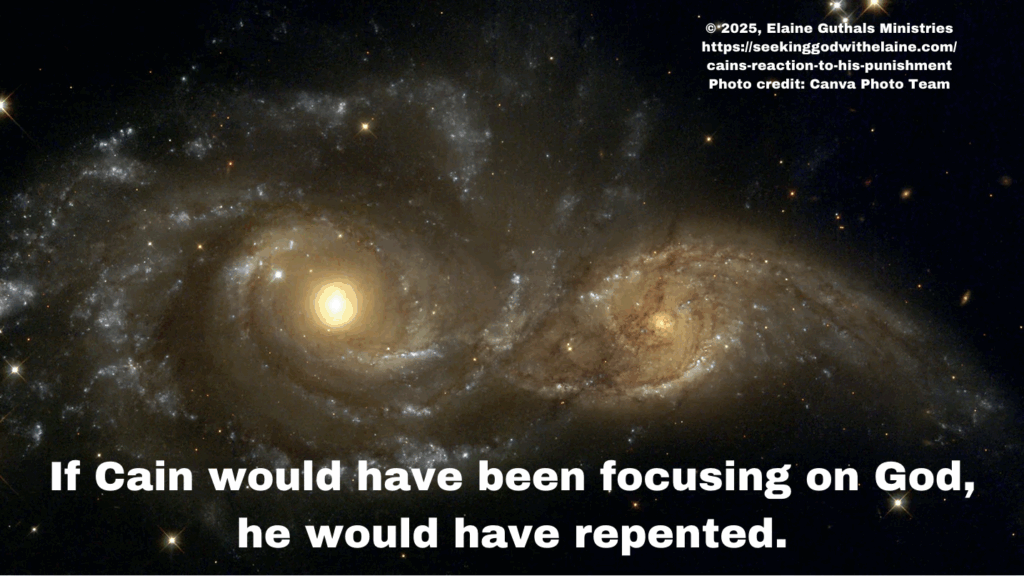
While Cain was right in the laws broken were God’s laws, he was wrong to think God was the One in fault. Cain made his own choice whether to obey the law or not. He chose not to obey.
Cain was cut off from God, the worst punishment that there is. He was being banished from was God’s Shekinah, His glory.
Cain was concerned for his safety. He was afraid his brothers would kill him for killing Abel. Seth wasn’t the only other brother Cain had.
We have no idea what kind of mark God placed on Cain. Whatever the physical mark, Cain would have to live a long life with the mental mark on his conscience.
Sin takes us to the polar opposite than salvation. The most important element of any sin is disobedience to God. The punishment for that sin had already been declared.
We don’t have GPS coordinates for the Land of Nod. All we know about Nod was it was east of Eden.
Nod is a Hebrew word that means wanderer, exile, or fugitive. It may not be a specified piece of land. It may be wherever he wandered.
The main thing for Cain would have been that the Land of Nod was not the Land of Eden. He was leaving everything that he had always known. He was leaving his mother and father.
Cain was leaving God. No matter what he did, no matter wherever he went, he would never get back to the presence of God. Cain was always in Nod, never in Eden.
God was showing us, through the story of Cain, what it is like to be outside His presence. It is misery based on exile. It is unsettled living.
Descendants of Cain
Cain, even though he was an ungodly man, did his part to go forth and multiply. At some point in his life, Cain became a family man.
Cain’s wife may have been his sister. But then, some think that the world was also populated at this time by angels and daughters hooking up.
Enoch, named for Cain’s son, was the first city.
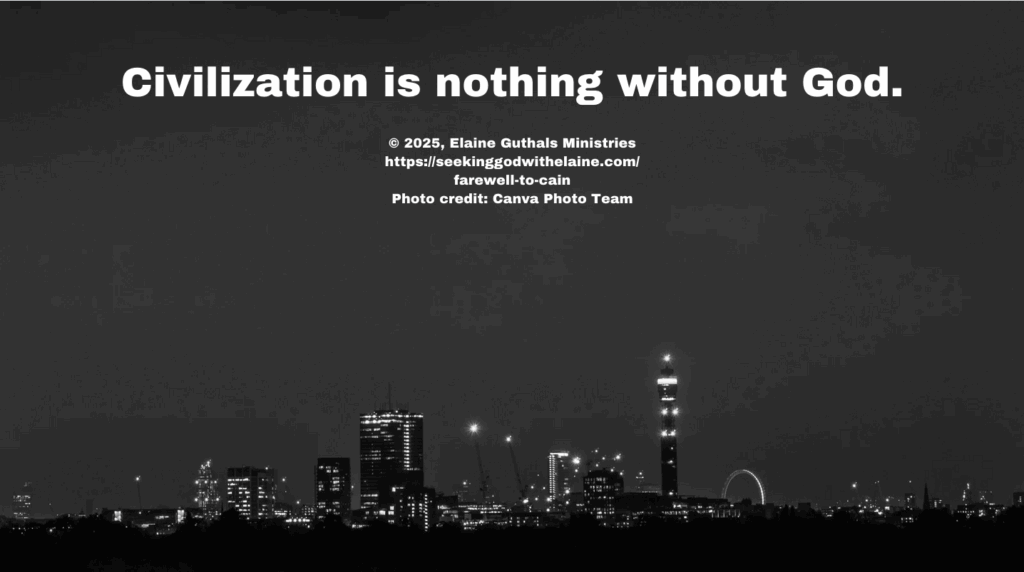
Even though Lamech was prosperous, he didn’t have everything he needed — he didn’t have God.
Lamech ignored God’s design of marriage. He was a polygamist, having two wives at the same time.
The family was to be the nucleus of society. Families were to take care of widowed family members.
The first son, Jabal, herded livestock as he lived in tents. Was Jabal trying to go back to Abel’s occupation but not his God.
The second son, Jubal, became a musician.
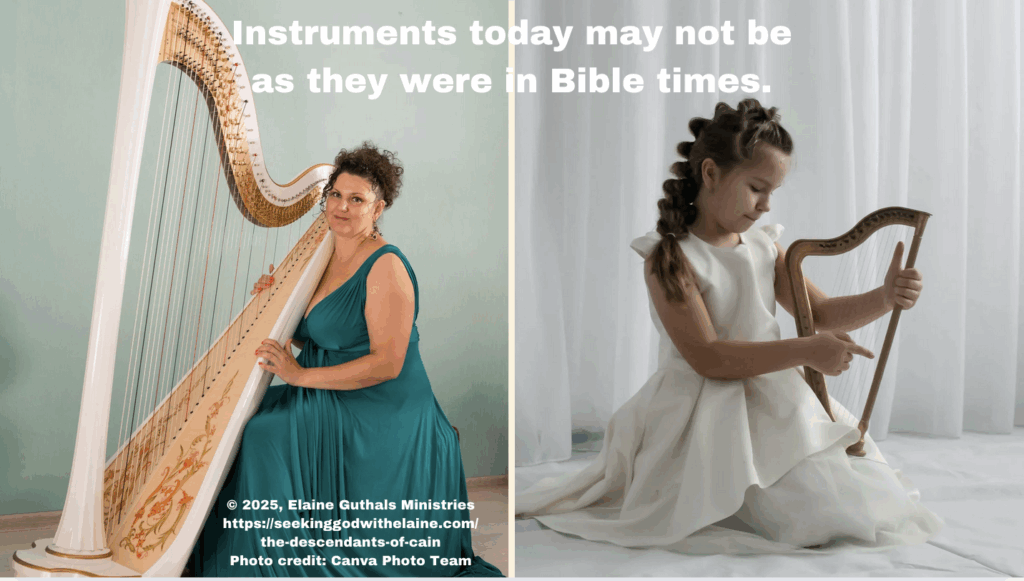
The third, Tubal-Cain, not only became an inventor of metal tools, but he also taught the craft.
If music and inventions aren’t sinful, what is? The motivation is what needs to be evaluated.
It is interesting to note that a daughter was named here. Naamah is Tubal-Cain’s sister. Women generally aren’t not listed in genealogy lists unless it says they are the wife of someone.
After Lamech killed a man, he compared his situation with that of Cain’s.
Both had killed another man. Both allowed one sin to lead to another. To me, neither was remorseful.
Cain tried to cover up the murder of Abel. Lamech didn’t.
What I notice in Lamech’s poem is the arrogance. Cain came off more as guilty and defensive. He definitely was not bragging.
Cain purposefully attacked and murdered Abel. While we aren’t given any information about the murder, a man attacked Lamech. Wouldn’t that be self-defense? That isn’t murder – unless Lamech started it.
God protected Cain with a mark when he felt others would kill him. But Cain also probably saw it as the punishment it was.
Lamech just saw the mark of Cain as protection, not punishment. Protection he didn’t get. Maybe that is why he, himself, tried to up the punishment of anyone who killed him.
God weighed in on Cain. He was silent on Lamech.
The Birth of Seth
Adam and Eve had a third son. I bet, in a way, this birth was bittersweet.
Eve knew God patiently allows us to turn back to Him. Her faith was shown front and center here.
God promised Eve redemption through One of her descendants. Yeah, Seth was the anointed one

Seth had a son he named Enosh. We don’t know much about him. Circumstances in the world were very bad some time after Enosh was born.
We all have opportunities to choose to sin. It is imperative that we have discernment to choose between right and wrong.
Humans chose to worship God corporately.
Adam and Eve praised God by the name of which they knew Him. Anyway, we should focus on the worship, not the name. They openly aligned themselves with God.
We shouldn’t think that they hadn’t individually worshiped God through prayer before this. That is probably the first corporate worship.
Prayer didn’t have to wait until Matthew 6. It was an Old Testament habit. Abraham was considered righteous. That was pre-Christ. That was not pre-prayer.

We are not to just go through the motions — as right as they might be. Our worship for God must produce a change in us — and continue changing us until we are called home.
We can’t go to worship because it is expected of us. We must go out of our desire to be in God’s presence so that He can sanctify us.
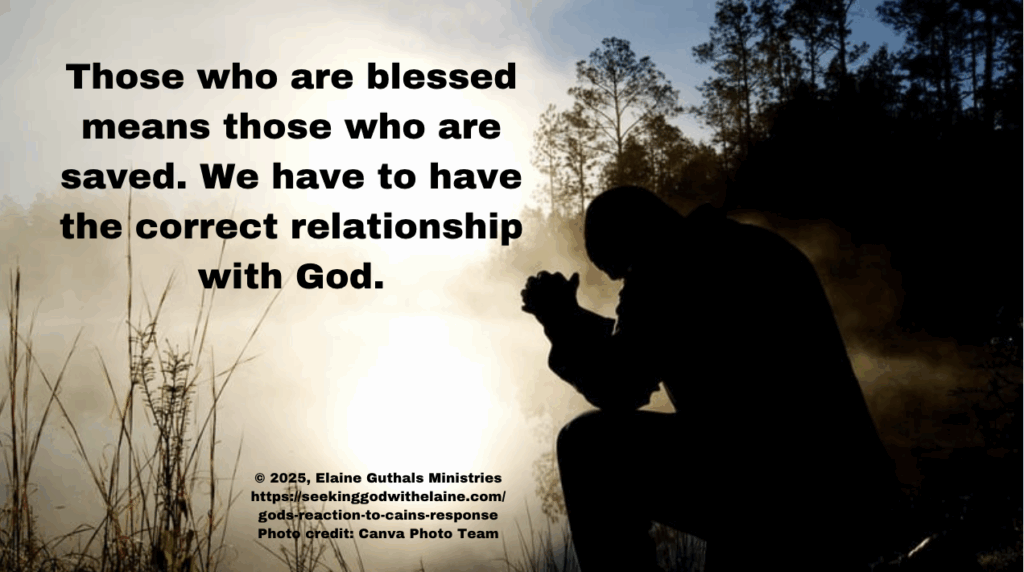
God will tell us about bad stuff — disobedience, persecution, exiles. He wants us to know that He will punish us when we sin.
But God mostly focuses on saving us. He loves us and wants our relationship with Him restored.

To read devotions in the Creating Everything theme, click the button below.
Devotions in the Celebrating Creation’s Story series